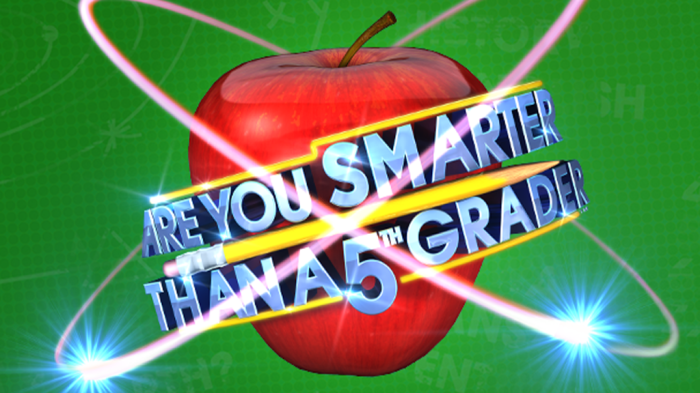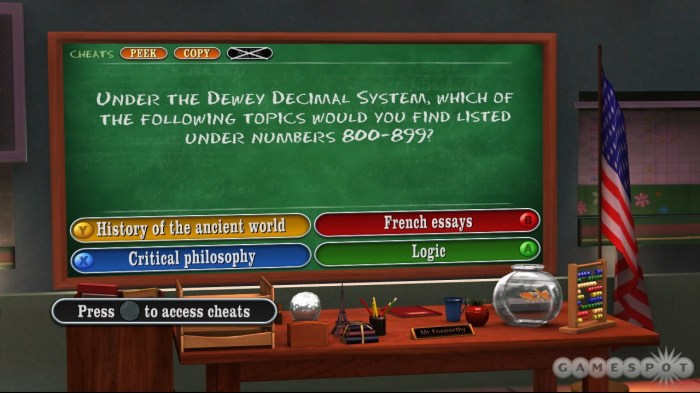Are you smarter than a 7th grader questions and answers – Are you smarter than a 7th grader? This intriguing question has captivated audiences worldwide, igniting a discourse on intelligence, education, and the boundaries of knowledge. Embark on an intellectual journey as we delve into the intricacies of this captivating show, exploring its format, cognitive challenges, and cultural significance.
From the trivia-filled realm of science to the annals of history and the vast tapestry of geography, “Are You Smarter Than a 7th Grader?” tests the limits of our knowledge and challenges our assumptions about intelligence. Join us as we unravel the secrets of this enigmatic game, uncovering the skills it demands and the impact it has on education and society at large.
Overview of “Are You Smarter Than a 7th Grader?”: Are You Smarter Than A 7th Grader Questions And Answers
The television show “Are You Smarter Than a 7th Grader?” is a popular game show that tests contestants’ knowledge against a panel of 7th-grade students. The show’s concept is simple yet effective: adults compete to answer questions from various subjects that are typically covered in 7th-grade curriculum.
The show’s popularity stems from its relatable premise and the element of surprise. Viewers are often shocked by the difficulty of some questions and impressed by the knowledge of the 7th graders. The show has become a cultural phenomenon, spawning international adaptations and inspiring various merchandise.
Format and Rules of the Game, Are you smarter than a 7th grader questions and answers
The game is played in a single-elimination format, with contestants progressing through a series of rounds. Each round consists of five questions, each with four possible answers. Contestants must choose the correct answer within a time limit. If a contestant answers incorrectly, they are eliminated from the game.
The final round, known as the “Double or Nothing” round, offers contestants the chance to double their winnings. However, if they answer incorrectly, they lose all their winnings.
Types of Questions Featured on the Show
The questions on “Are You Smarter Than a 7th Grader?” cover a wide range of subjects, including:
- Science (biology, chemistry, physics)
- History (American, world)
- Geography
- Math
- English (grammar, literature)
- Arts (music, art, drama)
Questions are typically presented in a multiple-choice format, with four possible answers. The questions vary in difficulty, with some being straightforward and others requiring more in-depth knowledge.
Examples of typical questions asked on the show include:
- What is the capital of France?
- Who was the first president of the United States?
- What is the chemical symbol for gold?
- What is the Pythagorean theorem?
- What is the name of the largest ocean in the world?
Skill Level and Cognitive Abilities Tested

The questions on “Are You Smarter Than a 7th Grader?” test a variety of cognitive skills, including:
- General knowledge
- Problem-solving
- Critical thinking
- Memory
- Attention to detail
The difficulty of the questions varies, with some being appropriate for elementary school students and others being more challenging, even for adults. The show’s producers have stated that the questions are designed to be fair and to reflect the actual 7th-grade curriculum.
The show has been criticized by some for underestimating the intelligence of 7th graders. However, the show’s producers have defended the difficulty of the questions, arguing that they are representative of the high standards of education in the United States.
Impact on Education and Learning

The show “Are You Smarter Than a 7th Grader?” has had a significant impact on education and learning. The show has sparked a renewed interest in learning and has shown that even adults can benefit from reviewing basic academic concepts.
The show has also been credited with helping to improve students’ critical thinking skills. By watching the show, students can see how to approach problems and how to evaluate evidence. The show can also help students to develop a better understanding of the importance of education.
In addition, the show has helped to make learning more fun and engaging. The show’s fast-paced format and humorous tone make it an enjoyable way to learn new things.
Cultural and Social Significance

The show “Are You Smarter Than a 7th Grader?” has become a cultural phenomenon. The show has been parodied in popular culture and has inspired various merchandise. The show has also been the subject of academic research.
The show’s popularity is due in part to its relatable premise and its element of surprise. Viewers are often shocked by the difficulty of some questions and impressed by the knowledge of the 7th graders. The show has also tapped into a nostalgia for childhood and the desire to test one’s knowledge against younger generations.
The show has also had a positive impact on perceptions of intelligence and academic achievement. The show has shown that intelligence is not limited to children and that adults can still learn and improve their knowledge.
FAQ Compilation
What is the format of “Are You Smarter Than a 7th Grader?”?
Contestants face a series of multiple-choice questions drawn from various subjects typically taught in 7th grade. They must answer correctly to advance through the levels and ultimately win the grand prize.
What types of questions are featured on the show?
Questions cover a wide range of topics, including science, history, geography, literature, and pop culture. They are designed to test contestants’ knowledge, problem-solving skills, and critical thinking abilities.
How difficult are the questions on “Are You Smarter Than a 7th Grader?”?
The difficulty of the questions varies depending on the level of the game. While some questions may be accessible to younger students, others require a deep understanding of the subject matter and can challenge even adults.
What is the impact of “Are You Smarter Than a 7th Grader?” on education?
The show has sparked interest in learning and encouraged students to expand their knowledge beyond the classroom. It has also highlighted the importance of critical thinking and problem-solving skills in real-world situations.